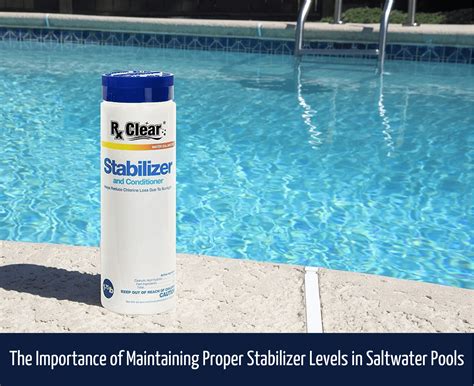Maintaining a pool can be a daunting task, especially when it comes to ensuring the water is safe and enjoyable for swimmers. One crucial aspect of pool maintenance is the use of a pool stabilizer, also known as conditioner or CYA (cyanuric acid). In this article, we will delve into the world of pool stabilizers, exploring their importance, benefits, and how to use them effectively.
What is a Pool Stabilizer?

A pool stabilizer is a chemical additive that helps to protect the chlorine in your pool water from the sun's ultraviolet (UV) rays. Chlorine is a powerful disinfectant that kills bacteria, viruses, and other microorganisms in the water. However, when exposed to sunlight, chlorine can break down quickly, reducing its effectiveness. This is where a pool stabilizer comes in – it forms a protective shield around the chlorine molecules, preventing them from being destroyed by UV radiation.
How Does a Pool Stabilizer Work?
A pool stabilizer works by binding to the chlorine molecules in the water, creating a stable complex that resists degradation from UV light. This complex allows the chlorine to remain effective for a longer period, reducing the need for frequent additions of chlorine. The stabilizer also helps to prevent the formation of chloramines, which are unpleasant-smelling compounds that can irritate the eyes, skin, and respiratory system.Benefits of Using a Pool Stabilizer

Using a pool stabilizer offers several benefits, including:
- Reduced chlorine consumption: By protecting the chlorine from UV degradation, a pool stabilizer helps to reduce the amount of chlorine needed to maintain safe and healthy water.
- Improved water quality: A pool stabilizer helps to prevent the formation of chloramines, which can cause eye irritation, skin rashes, and respiratory problems.
- Increased swimmer comfort: By reducing the amount of chlorine needed, a pool stabilizer helps to create a more comfortable swimming environment.
- Cost savings: Using a pool stabilizer can help to reduce the overall cost of pool maintenance by reducing the amount of chlorine needed.
Types of Pool Stabilizers
There are several types of pool stabilizers available, including:- CYA (Cyanuric Acid): This is the most common type of pool stabilizer and is available in granular or liquid form.
- Conditioner: This type of stabilizer is designed to work in conjunction with chlorine tablets or granules.
- Stabilizer tablets: These tablets contain a combination of CYA and other ingredients that help to stabilize the chlorine in the water.
How to Use a Pool Stabilizer
Using a pool stabilizer is relatively straightforward. Here are some general guidelines:- Initial application: Apply the recommended amount of stabilizer to the pool water, usually 10-20 ppm (parts per million).
- Maintenance: Add the recommended amount of stabilizer to the pool water on a regular basis, usually every 1-2 weeks.
- Testing: Regularly test the pool water to ensure the stabilizer level is within the recommended range.
Pool Stabilizer Safety Precautions

When using a pool stabilizer, it's essential to follow some basic safety precautions:
- Handle with care: Pool stabilizers can be hazardous if not handled properly. Always wear protective gloves and eyewear when handling the product.
- Avoid skin contact: Avoid skin contact with the stabilizer, as it can cause irritation.
- Keep out of reach of children: Keep the stabilizer out of reach of children and pets.
Common Pool Stabilizer Problems
Here are some common problems associated with pool stabilizers:- Insufficient stabilizer: If the stabilizer level is too low, the chlorine may not be protected from UV degradation.
- Excessive stabilizer: If the stabilizer level is too high, it can cause problems with the pool water's pH level.
- Incompatible products: Using incompatible products with the stabilizer can cause problems with the pool water's chemistry.






What is the recommended stabilizer level for my pool?
+The recommended stabilizer level for your pool is between 30-50 ppm (parts per million).
Can I use a pool stabilizer with a saltwater pool?
+Yes, you can use a pool stabilizer with a saltwater pool. However, you should consult with a pool professional to determine the best stabilizer for your specific pool type.
How often should I test my pool water for stabilizer levels?
+You should test your pool water for stabilizer levels at least once a week, and adjust the level as needed.
In conclusion, a pool stabilizer is an essential product for maintaining safe and healthy pool water. By understanding the benefits and proper use of a pool stabilizer, you can ensure a comfortable and enjoyable swimming experience for you and your family. Remember to always follow the recommended safety precautions and guidelines for using a pool stabilizer.
